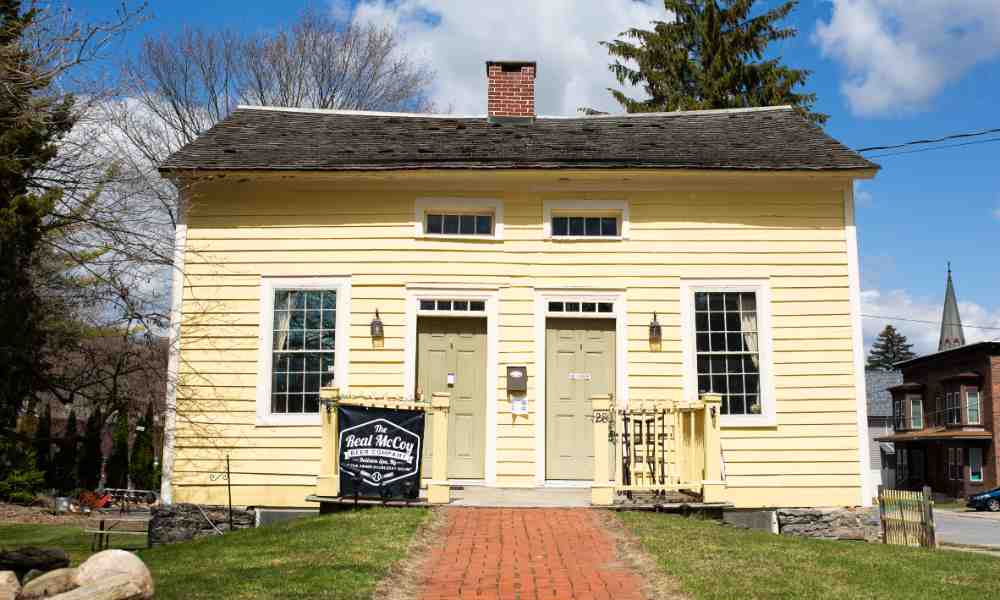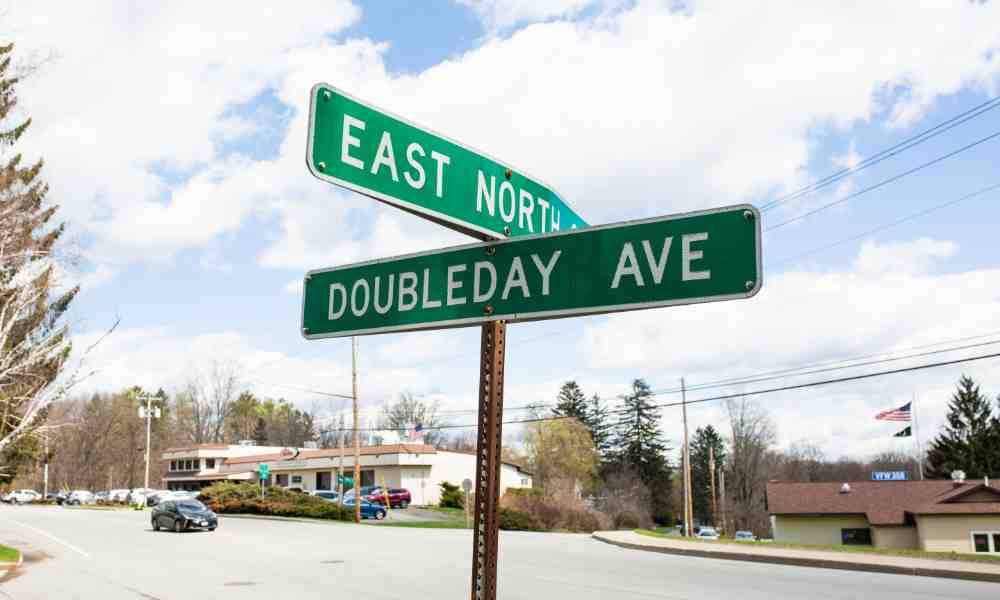Cooperstown is home to only 1,730 people, but more than 300,000 journey to the tiny Otsego County village’s world-famous cultural attraction each year. In fact, “Cooperstown” and “baseball” have become so connected—almost synonymous, in fact—that it’s rare to stop and think, “Why, exactly, is the National Baseball Hall of Fame in a tiny town in Upstate New York?” That’s a shame, because the answer is a whopper of a fairytale involving Ballston Spa native Abner Doubleday, who was inaccurately credited with a legacy more fantastical than he could have ever imagined.
The myth: Abner Doubleday invented the game of baseball, and he did so in Cooperstown.
The reality: There isn’t even a shred of evidence to support the narrative that Doubleday is the founding father of America’s national pastime. But more on that later.
While Doubeday might not be the sports hero he was credited as being, he was still a bonafide local celebrity of sorts in his own right—although his due credit arrived posthumously. Born in Ballston Spa in 1819, he hailed from a family with a proud military tradition, destined to make history on the battlefront. During the American Revolution, Doubleday’s paternal grandfather fought at the Battle of Bunker Hill, served at Valley Forge, and fought in the Battle of Stony Point. His maternal grandfather, meanwhile, was a messenger for George Washington in the early days of the Revolution. Doubleday’s father, Ulysses, fought in the War of 1812, serving at the naval facility at Sacketts Harbor. He went on to publish newspapers and books and served two terms in Congress, scholarly interests he worked to pass on to his son.
“I was brought up in a book store and early imbibed a taste for reading,” the younger Doubleday wrote in a letter that is part of the Baseball Hall of Fame library’s collection. (Yes, despite his not being the founder of baseball, relics from Doubleday’s life can be found in Cooperstown.) “I was fond of poetry and art and much interested in mathematical studies. In my outdoor sports I was addicted to topographical work and even as a boy amused myself by making maps of the country around my father’s residence which was in Auburn, Cayuga County, New York.”
While growing up in Auburn, Doubleday knew at a young age that he would follow his family’s military tradition. He started his studies at the Cooperstown Classical and Military Academy before being appointed to West Point in 1838. After graduating, our budding war hero was commissioned a brevet second lieutenant in the 3rd Artillery and was sent to Fort Johnson in North Carolina for his first assignment. Doubleday’s initial combat came during the Mexican War, from 1846 to 1848. He was then sent to Texas, and a few years later to Florida. According to the National Archives, Doubleday’s activities involved mapping the Everglades and the areas that became Miami and Fort Lauderdale, including planning for roads and water drainage.

His next posting, to the garrison at Fort Moultrie at Charleston, had a profound influence on his military career. It was the 1850s, when the Army was experiencing a serious, significant split regarding slavery; Doubleday was a supporter of abolition and voted for Abraham Lincoln in 1860. Before the Civil War, Doubleday noted that Charleston was not a pleasant place to be, commenting, “Almost every public assemblage was tinctured with treasonable sentiments and toasts against the flag were always warmly applauded.”
Doubleday’s service against the Confederacy began where the war commenced: at Fort Sumter in Charleston. In the early morning hours of April 12, 1861, forces from the Confederate States of America attacked the United States military garrison there. Doubleday actually fired the Union’s first cannon shot, earning him a footnote in history, but less than two days later, the fort surrendered. No one was killed, but the battle began the bloodiest conflict in American history. Under the rules of engagement, the Fort Sumter battalion was allowed to abandon the fortress, and Doubleday was transferred to command the garrison at Fort Hamilton, closer to home here in New York.
Doubleday was promoted to major, and then brigadier general of U.S. Volunteers. He fought at Antietam in Maryland, where more than 22,000 were killed or wounded in a single day of carnage. Doubleday’s bravery at Antietam earned him a promotion to major general of U.S. Volunteers in the Army of the Potomac.
By the third year of the Civil War, Doubleday had earned acclaim as a dependable general, albeit one with little fanfare. His biographer, Thomas Barthel, said, “He has never been given credit he deserves for his actions in the Civil War or later because he was not one of the boys. He was not glamorous. Seen not as a foolhardy soldier but as a steadfast one, many times in the future Doubleday would be asked to anchor a line and protect the flank of a large body of soldiers. This reputation was not glamorous. But Doubleday was not a man to worry about his appearance; rather, his concern would be his obligations to the men in his command.”
It was at Gettysburg that Doubleday and his troops participated in the turning point of the Civil War. Some historians make the argument that he kept Cemetery Ridge as part of the Union lines the first day of the infamous battle. In a letter to his wife, Doubleday described the horror: “The most awful battle of the War occurred yesterday. They then attacked near my position, opening with from 100 to 150 pieces of artillery…I was hit and pitched over my horse’s neck by a piece of shell which struck me in the back of the neck. Luckily, I was hit squarely by the smooth round surface. Had the jagged part struck first it would have killed me.”
Doubleday’s final combat experience was fending off Confederate Gen. Jubal Early during raids in 1864 at Washington, DC. Transitioning out of the Union volunteer service in late August 1865, Doubleday became a colonel in the regular Army and was sent to California, where he helped get a charter for the first cable car railway in San Francisco.

And speaking of making history, by 1871 Doubleday had moved to Texas, where he commanded the all-Black 24th Infantry Regiment—and was connected to baseball for the one and only documented time. It was there that Doubleday asked his superiors to “purchase baseball implements for the amusement of the men.”
Expensing baseballs? Once? That’s hardly enough to warrant Doubleday’s being named the founder of the sport. So where on earth does baseball fit into our local war hero’s story? In reality, it doesn’t…but facts don’t always make for the most romantic narrative, and the error is in fact traceable, just not to his well-meaning diversion goals in Texas. It started instead in 1905, when Abraham Mills was appointed by sporting goods mogul Albert G. Spalding to head a commission to determine when and where baseball originated. Spalding had been engaged in a dispute with Henry Chadwick, a native of Exeter, England who contended that the all-American sport we love today actually evolved from the English game of rounders. But Spalding wasn’t having it. He personified the hyper-American nationalism customary of the time, and was adamant baseball was solely an American creation.
The commission’s report, released in 1908, stated that Doubleday invented baseball at Cooperstown in 1839—despite the fact that at that time, Doubleday was a 20-year-old plebe at West Point. So how did the Mills Commission come up with this story?
In his report, Mills refers to a “circumstantial statement by a reputable gentleman, according to which the first diagram, indicating positions for players, was drawn by Abner Doubleday in Cooperstown, N.Y. in 1839.” Mills then eulogized Doubleday, whom he had known personally. Finally, he stated succinctly, baseball “had its origins in the United States” and “according to the best evidence obtainable to date” the game “was devised by Abner Doubleday at Cooperstown, N. Y. in 1839.” That, apparently, was enough to satisfy Spalding.
It wasn’t difficult to poke holes in the report’s conclusions. How odd that Mills and Doubleday were friends for more than a quarter-century, yet it wasn’t until about a dozen years after Doubleday’s death that Mills learned through a “circumstantial statement” that Doubleday had “invented” baseball. Also, after retiring from the Army, Doubleday wrote a number of articles for newspapers and magazines (following in Dad’s footsteps). He never mentioned baseball in any of them, or in the 67 diaries he kept. And again, there’s the bald fact that in 1839, while he was supposedly conceptualizing baseball in Cooperstown, Doubleday was documented to be at West Point, and had been since September 1, 1838. His only leave of absence during his four years there was from June 18 to August 28, 1840.
So, if not Doubleday, then who? Many believe Chadwick’s theory that the game of baseball was derived from rounders. There is also credible documentation that a player named Alexander Cartwright established the first formal rules of the sport that were used in an 1845 contest in Hoboken. Cartwright—not Doubleday—was eventually enshrined in the Hall of Fame. Cartwright’s plaque in Cooperstown’s hallowed Hall reads, “FATHER OF MODERN BASE BALL.”
So alas, Doubleday was not the creator of baseball, although it’s hard to feel sad about stripping him of the title—he died years before he was erroneously dubbed the pastime’s founder. And even without any connection to baseball, Doubleday secured a rightful spot in history: war hero, instead of sports hero. After retiring from military service in 1873, he moved with his wife, Mary, to Mendham, NJ, where they lived a quiet life. They had no children. Doubleday died in 1893, and his wife died in 1907. They are buried at Arlington National Cemetery.
As for Cooperstown? The tiny village, though it may not have a true connection to baseball, has proven to be a most wonderful steward to the heritage of the great American game.


